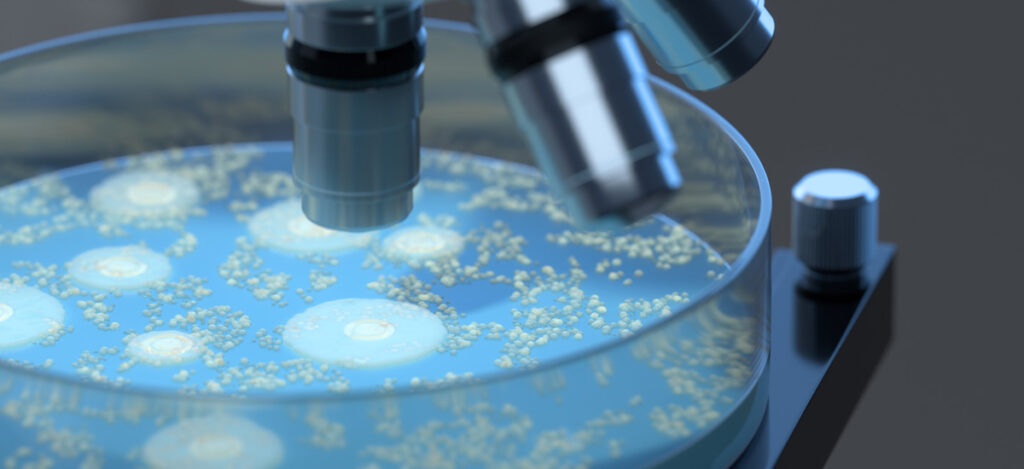Cytotoxicity Testing vs. Microbiology Testing
What is cytotoxicity?
The “cyto” in cytotoxicity stands for cell. The “toxic” component of cytotoxicity refers to something poisonous. Thus, cytotoxicity refers to molecules and compounds that are poisonous to living cells. Cytotoxins are often chemical but can also be from natural or biological sources.
What is microbiology?
Microbiology can be broken down into the Greek and Latin roots of “micro,” “bio,” “ology.” The “micro” stands for small, the “bio” stands for biology, and the “ology” stands for “the study of.” Microbiology can also be defined by “microbial,” which refers to microorganisms. Suppose we put all of those Greek and Latin roots in combination with the definition of microbial. In that case, we understand that microbiology is the study of microorganisms, where microorganisms are small living components of the broad field of biology.
How do microbiology and cytotoxicity relate?
Microbiology has to do with identifying the species and genus of different microbes (fungi, bacteria, etc.) in a sample. Microbiology also involves quantifying the number of microbes in a sample using colony-forming units (CFUs). Cytotoxicity, like microbiology, is also a form of identification. However, where microbiology identifies different microbes, cytotoxicity identifies all molecules poisonous to living cells. Cytotoxic molecules could come from artificial, natural, microbial, or inanimate sources. Thus, microbiology and cytotoxicity differ in what they identify, i.e., microbes and toxins, respectively. Furthermore, microbiology is specific to microorganism identification, while cytotoxic components can come from sources other than microbes.

What are the differences between microbiology testing and cytotoxicity testing?
Cytotoxicity testing evaluates the biological reactivity of mammalian cells and tissues to contact with elastomeric plastics and other polymeric materials that will come in direct or indirect patient contact during medical device or product use. Cytotoxicity is significant as it evaluates the biological effects of a sample’s leachable chemicals. The types of cytotoxicity testing to perform for your medical device or product depend upon the final product, the final product’s intended use, and the materials the final product is made of and packaged within. In-vitro methods of cytotoxicity testing include direct contact, agar diffusion, and elution testing. In-vivo methods of cytotoxicity testing include intracutaneous injection, systemic, and implantation testing. Most medical devices and products will only require in-vitro cytotoxicity testing. Reusable devices may require cytotoxicity testing for initial use and device use following recommended reprocessing. Cytotoxicity testing follows the methods outlined in USP 87 for in-vitro testing and USP 88 for in-vivo testing.
In contrast, microbiology testing identifies the presence and the type of microbes in a manufacturing environment, medical product, or medical device. Specific regulatory testing for microbiology may include assays such as microbial enumeration testing, particulate analysis, yeast analysis, antifungal activity assessment, growth promotion testing, microbial limits testing, zone of inhibition testing, water analysis, bacteriostasis/fungistasis testing, bacteria identification, yeast identification, fungi identification, gram-negative staining, product inoculations, biological indicator tests, and BI incubation time reduction studies. USP 61 and USP 62 govern microbiology testing.
Why are both microbiology testing and cytotoxicity testing important?
Cytotoxicity testing is especially for medical products or devices that will be inserted into the human body. Suppose cytotoxins (such as leachable chemicals or bacterial endotoxins) exist on or within medical devices or products. In that case, the patient exposed will be at risk of fever, organ failure, cancer, and (in severe cases) death. Thus, cytotoxicity testing is an important quality control step for medical devices or products.
Microbiological testing is imperative for preventing product-induced infections and mitigating contamination risk in manufacturing environments, especially aseptic manufacturing environments. Aseptic manufacturing environments rely heavily on microbiological testing because aseptic processing requires excluding microorganisms from the manufacturing methods. Thus, microorganisms must be prevented from entering open containers or product materials during aseptic processing. As a result, microbial tests monitor clean rooms and facilities that manufacture products using aseptic processing.
Summary
Overall, both cytotoxicity and microbiology testing are imperative for regulatory approval of a medical device or medical product. Cytotoxicity tests ensure that medical devices and products are free of harmful toxins and are an important part of toxicity testing for product safety. Microbiology tests ensure that medical devices, products, manufacturing environments, and packaging are free from microbial contamination to support sterility maintenance. Maintenance of sterility ensures that patients will not be at risk of infection following device exposure or product implantation. When choosing a contract testing organization for your medical devices and products, ensure you find a company that suits your unique medical device or product needs.
Ethide Labs is a contract testing organization specializing in Microbiology Testing & Cytotoxicity Testing. Ethide Labs also offers Bacterial Endotoxin Testing, EO Residual Testing, Environmental Monitoring, Sterility Testing, Bioburden Testing & Package Integrity Testing services for medical device companies and allied industries. Ethide is an ISO 13485 certified facility.
References
United States Pharmacopeial Convention. <61> Microbiological Examination of Nonsterile Products: Microbial Enumeration Tests. Rockville, MD, USA. 2021. (USPC <61>).
United States Pharmacopeial Convention. <62> Microbiological Examination Of Nonsterile Products: Tests For Specified Microorganisms. Rockville, MD, USA. 2021. (USP <62>).
United States Pharmacopeial Convention. <87> Biological Reactivity Tests, In Vitro. Rockville, MD, USA. 2021. (USPC <87>).
United States Pharmacopeial Convention. <88> Biological Reactivity Tests, In Vivo. Rockville, MD, USA. 2021. (USPC <88>).
Share this in your social networks


